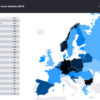The UK national living wage has risen to £8.91 this year, with those 23 and over included in the highest rate for the first time by the Government. The new living wage for 2021 means an annual pay rise of £345 for full-time employees on this rate.
With the new minimum wage rates designed to protect the lowest paid and also firms as they recover from the impact of COVID-19, this got us curious as to how salary increases in the UK compared to countries across the globe.
To find out Mitrefinch, global leaders of time and attendance software, decided to take a closer look at average salary data across the world to understand which countries have seen the largest salary increase over the past two decades. Analysing data from the Organisation for Economic Cooperation and Development (OECD) allowed us to crunch the numbers on which countries are getting the largest pay rises for annual pay and minimum wage.
Which countries have seen the highest salary increases?
We found the UK ranks in 20th place for average annual salary increase over the past two decades, with a 20% increase in salaries for full-time workers since 2000. So, which countries scored in the top three?
Our payroll system research found that, with an increase of 148% in annual salaries, workers in Latvia have seen the highest pay increase since 2000, where the average salary was £8,263.73. According to Salary Explorer, the best paying jobs in Latvia in 2021 are surgeons/doctors, judges and lawyers.
Following closely behind are Lithuania and Estonia, where salaries have risen by 144% and 138% since 2000 respectively. All three of these countries had the lowest salaries in 2000 but have been replaced by Mexico, Slovak Republic and Hungary in recent years.
Which countries have the highest annual salary in the world?
The highest annual salary for full-time workers can be found in Luxembourg, where workers are earning an average of just under £50,000 a year. This is a 17% increase compared to the average salary from 2000. Second in the running is Iceland, known for its high cost of living, where salaries have risen by 33% in the last 20 years to reach £48,964.
Where in the world have salaries fallen in the past two decades?
At the other end of the spectrum, the research revealed that in two countries, average annual salaries are in fact declining. In both Greece and Portugal, the data shows a decline in salary by 2.5% and 3.2% respectively.
The full annual average salary rankings revealed
| Country | Rise in average salary |
| Latvia | 147.91% |
| Lithuania | 143.65% |
| Estonia | 137.91% |
| Czech Republic | 73.91% |
| Slovak Republic | 65.51% |
| Hungary | 55.93% |
| Poland | 52.94% |
| Chile | 49.99% |
| Korea | 44.41% |
| Norway | 43.64% |
| Slovenia | 41.48% |
| Sweden | 35.41% |
| Ireland | 34.51% |
| New Zealand | 33.94% |
| Iceland | 33.27% |
| Denmark | 25.51% |
| France | 21.43% |
| United States | 20.49% |
| Canada | 20.42% |
| United Kingdom | 20.37% |
| Finland | 19.12% |
| Germany | 18.38% |
| Australia | 17.86% |
| Luxembourg | 16.68% |
| Switzerland | 15.07% |
| Austria | 11.60% |
| Israel | 10.23% |
| Netherlands | 9.91% |
| Belgium | 8.82% |
| Mexico | 5.09% |
| Italy | 3.11% |
| Spain | 2.17% |
| Japan | 1.49% |
| Greece | -2.48% |
| Portugal | -3.20% |
Where in the world has the minimum wage risen the most?
The UK ranks 15th for hourly real minimum wage rises, with the data showing an increase of 48% since 2001 for workers. In the top spot is Latvia with an increase of 291%, where the minimum wage rate now stands at £3.10.
The data shows the real hourly minimum wage in the United States has fallen by 1.35% since 2001 and now stands at £5.26 or $7.30. The US is the only recorded drop in hourly minimum wage across all 29 countries in the data set.
Which country has the highest minimum wage?
The highest minimum wage is in Australia where workers are benefiting from an hourly salary that is 74% higher than the average. Luxembourg has the second-highest minimum wage, where observers of the economy have worried about an excessive increase in wage costs. The minimum wage for workers in Luxembourg is calculated in line with the cost of living and has increased by 15% since 2001.
| Country | Real minimum wage |
| Australia | £9.07 |
| Luxembourg | £9.00 |
| France | £8.71 |
| New Zealand | £7.92 |
| Netherlands | £7.92 |
| Belgium | £7.92 |
| United Kingdom | £7.56 |
| Canada | £7.34 |
| Ireland | £7.27 |
| Korea | £6.19 |
The data revealed the UK ranks seventh for the highest hourly real minimum wage across all the countries included. The average wage in the UK is 45% above the world average.
The full hourly minimum wage rankings revealed
| Country | Increase |
| Latvia | 290.91% |
| Lithuania | 191.30% |
| Estonia | 188.89% |
| Korea | 186.67% |
| Slovak Republic | 128.57% |
| Turkey | 123.33% |
| Poland | 109.09% |
| Brazil | 90.91% |
| Hungary | 89.66% |
| Czech Republic | 87.10% |
| Chile | 63.16% |
| Slovenia | 58.00% |
| New Zealand | 57.14% |
| Spain | 48.28% |
| United Kingdom | 47.89% |
| Canada | 41.67% |
| Portugal | 36.17% |
| Mexico | 33.33% |
| Ireland | 31.17% |
| Colombia | 28.57% |
| Israel | 25.45% |
| Costa Rica | 20.69% |
| France | 19.80% |
| Australia | 15.60% |
| Luxembourg | 14.68% |
| Netherlands | 2.80% |
| Belgium | 0.92% |
| Greece | 0.00% |
| United States | -1.35% |
Commenting on the figures, Julie Lock, Commercial Director at Mitrefinch said:
“The pandemic has meant financial worries for employees across the UK have amplified, with many concerned about losing their jobs or facing pay cuts. Many companies have implemented pay freezes over the past year, meaning employees have had to wait longer to receive a pay rise or promotion than they normally would have.
“The data shows us that although employees across the UK are benefiting from one of the highest hourly minimum wage rates, the increase of both this rate and annual average salaries for full-time employees has been slow in comparison to neighbouring countries.”
Jayne Harrison, Head of Employment Law at Richard Nelson LLP commented:
“The data shows average annual salaries in the UK are rising at a slower rate than many neighbouring countries. This is frustrating for many employees since house prices in the UK continue to rise at a faster rate than average salaries, causing major issues for young people in this country as they struggle to get into the property ladder.”
“After being hit by the pandemic, employees across the UK are looking to be supported financially by their employers as the economy begins to recover. Many key workers like social care, supermarket and delivery staff are not currently paid the real living wage in the UK. With the key role these workers have played in the pandemic, we are expecting to see more of a push back on this over the next year.”
Methodology
To work out which countries have seen the largest salary increase and minimum wage rise, we analysed data from the OECD from 2000 to 2019. From this we could work out a ranking of how the United Kingdom places in comparison to other countries across the world.
The figures selected for annual salaries were taken from OECD data on average annual wages per full-time and full-year equivalent employee in the total economy. This data is in 2019 constant prices at 2019 USD PPs.
The figures selected for minimum wages were selected from OECD data on hourly real minimum wages, in 2019 constant prices at USD PPs.
We used an exchange rate of 1.00 US Dollar = 0.72 British Pounds to convert the OECD figures to GDP for the purpose of this research.




